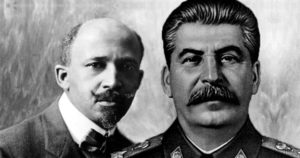When an American civil rights leader praised Stalin

It is important to recognize that attitudes towards Stalin in Western Europe and the USA have not been constant, nor were they ever homogenous. As the leader of the foremost Communist regime, Stalin’s crimes and virtues were heavily debated among Western intellectuals. Furthermore, the full extent of his terrible treatment of many Soviet citizens was not known immediately and was even actively denied by many in the USA and Europe.
Below is an obituary by W.E.B. Du Bois, a founder of the National Association for the Advancement of Colored People (NAACP) that praises Stalin. To modern readers, the idea of a civil rights leader in America praising a dictator probably seem strange. The American Communist party had some success in recruiting African Americans in the 1930s. This stemmed from the fact that Communism claimed to offer a non-racial way of addressing the economic inequality that affected African Americans. Indeed, one of the Soviet Union’s favourite attacks on America was to highlight the terrible injustices experienced by African Americans. Du Bois, however, had a complicated relationship with Communism, as did many leftists at the time. He refused to join the American Communist party during the 1930s, 1940s and 1950s and rejected the idea that Communism was the best way to address the concerns of the African American community. Nevertheless, he did write that the Soviet Union was the country that had done most to address the inequality that he believed was inherent to capitalist societies. Interestingly, Du Bois eventually joined the Communist party in 1961, just before he moved to Ghana, perhaps as a final act of defiance towards the American government before he left the country.
Joseph Stalin was a great man; few other men of the 20th century approach his stature. He was simple, calm and courageous. He seldom lost his poise; pondered his problems slowly, made his decisions clearly and firmly; never yielded to ostentation nor coyly refrained from holding his rightful place with dignity. He was the son of a serf but stood calmly before the great without hesitation or nerves. But also—and this was the highest proof of his greatness—he knew the common man, felt his problems, followed his fate.
Stalin was not a man of conventional learning; he was much more than that: he was a man who thought deeply, read understandingly and listened to wisdom, no matter whence it came. He was attacked and slandered as few men of power have been; yet he seldom lost his courtesy and balance; nor did he let attack drive him from his convictions nor induce him to surrender positions which he knew were correct. As one of the despised minorities of man, he first set Russia on the road to conquer race prejudice and make one nation out of its 140 groups without destroying their individuality.
His judgment of men was profound. He early saw through the flamboyance and exhibitionism of Trotsky, who fooled the world, and especially America. The whole ill-bred and insulting attitude of Liberals in the U.S. today began with our naive acceptance of Trotsky’s magnificent lying propaganda, which he carried around the world. Against it, Stalin stood like a rock and moved neither right nor left, as he continued to advance toward a real socialism instead of the sham Trotsky offered.
Three great decisions faced Stalin in power and he met them magnificently: first, the problem of the peasants, then the West European attack, and last the Second World War. The poor Russian peasant was the lowest victim of tsarism, capitalism and the Orthodox Church. He surrendered the Little White Father easily; he turned less readily but perceptibly from his ikons; but his kulaks clung tenaciously to capitalism and were near wrecking the revolution when Stalin risked a second revolution and drove out the rural bloodsuckers.
Then came intervention, the continuing threat of attack by all nations, halted by the Depression, only to be re-opened by Hitlerism. It was Stalin who steered the Soviet Union between Scylla and Charybdis: Western Europe and the U.S. were willing to betray her to fascism, and then had to beg her aid in the Second World War. A lesser man than Stalin would have demanded vengeance for Munich, but he had the wisdom to ask only justice for his fatherland. This Roosevelt granted but Churchill held back. The British Empire proposed first to save itself in Africa and southern Europe, while Hitler smashed the Soviets.
The Second Front dawdled, but Stalin pressed unfalteringly ahead. He risked the utter ruin of socialism in order to smash the dictatorship of Hitler and Mussolini. After Stalingrad the Western World did not know whether to weep or applaud. The cost of victory to the Soviet Union was frightful. To this day the outside world has no dream of the hurt, the loss and the sacrifices. For his calm, stern leadership here, if nowhere else, arises the deep worship of Stalin by the people of all the Russias.
Then came the problem of Peace. Hard as this was to Europe and America, it was far harder to Stalin and the Soviets. The conventional rulers of the world hated and feared them and would have been only too willing to see the utter failure of this attempt at socialism. At the same time the fear of Japan and Asia was also real. Diplomacy therefore took hold and Stalin was picked as the victim. He was called in conference with British imperialism represented by its trained and well-fed aristocracy; and with the vast wealth and potential power of America represented by its most liberal leader in half a century.
Here Stalin showed his real greatness. He neither cringed nor strutted. He never presumed, he never surrendered. He gained the friendship of Roosevelt and the respect of Churchill. He asked neither adulation nor vengeance. He was reasonable and conciliatory. But on what he deemed essential, he was inflexible. He was willing to resurrect the League of Nations, which had insulted the Soviets. He was willing to fight Japan, even though Japan was then no menace to the Soviet Union, and might be death to the British Empire and to American trade. But on two points Stalin was adamant: Clemenceau’s “Cordon Sanitaire” must be returned to the Soviets, whence it had been stolen as a threat. The Balkans were not to be left helpless before Western exploitation for the benefit of land monopoly. The workers and peasants there must have their say.
Such was the man who lies dead, still the butt of noisy jackals and of the ill-bred men of some parts of the distempered West. In life he suffered under continuous and studied insult; he was forced to make bitter decisions on his own lone responsibility. His reward comes as the common man stands in solemn acclaim.






